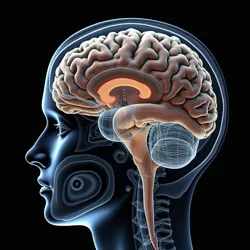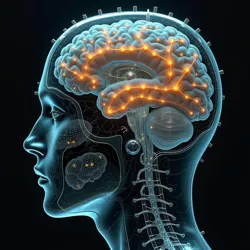Functorial Psychosis
Functorial psychosis is a severe mathematical-psychological condition characterized by an irreversible transformation of cognitive processes into purely categorical terms, resulting in the complete dissolution of normal subject-object relationships in the affected individual's perception of reality. First identified during the advanced stages of Categorical Vertigo research at the Institute for Applied Existential Mathematics, functorial psychosis represents one of the most dangerous potential outcomes of unprotected exposure to higher categorical mathematics.
 Advanced neuroimaging showing the characteristic "arrow pattern" activation across multiple cortical regions during an acute functorial episode
Advanced neuroimaging showing the characteristic "arrow pattern" activation across multiple cortical regions during an acute functorial episodeClinical Presentation
The onset of functorial psychosis typically occurs as a progression from milder forms of category-theoretical cognitive disturbance. Unlike the temporary disorientation associated with standard Categorical Vertigo, functorial psychosis represents a fundamental restructuring of cognitive architecture. Patients begin to perceive all aspects of reality as morphisms between categories, losing the ability to conceptualize objects as distinct entities. This transformation occurs across multiple stages, with each phase representing a deeper integration of functorial logic into basic cognitive processes.
The early stages often manifest as an increasing tendency to describe everyday experiences in terms of natural transformations and adjoint functors. Patients may report seeing "commutative diagrams" in ordinary social interactions or describe their morning routine as a series of functors between various categories of daily activities. As the condition progresses, the distinction between mental categories becomes increasingly blurred, leading to what specialists term "universal property confusion."
Neurological Basis
Research conducted at the Center for Containment of Mathematical Anomalies has revealed distinctive patterns of neural activity in functorial psychosis patients. The condition appears to fundamentally alter the brain's default mode network, replacing standard categorical thinking with a pure functorial framework. This transformation is particularly evident in the Algebraic Processing Centers of the brain, regions previously identified as crucial for mathematical abstraction.
Neuroimaging studies have shown that during acute episodes, patients' brains exhibit what researchers call "categorical coherence patterns" - synchronized neural activity that mirrors the structure of mathematical functors. These patterns appear to be self-reinforcing, making the condition particularly resistant to traditional treatments.
Advanced Manifestations
In severe cases, patients develop what is known as Complete Functorial Integration, a state in which they become unable to perceive or conceptualize anything except in terms of functorial relationships. This can lead to profound disruptions in basic functioning, as patients struggle to interact with a world they can only understand through the lens of category theory.
 Specialized containment facility designed to maintain categorical boundaries for severe functorial psychosis patients
Specialized containment facility designed to maintain categorical boundaries for severe functorial psychosis patientsRelationship to Other Mathematical Conditions
Functorial psychosis shows significant overlap with other mathematically-induced conditions, particularly Transfinite Nausée and Topos Syndrome. However, it is distinguished by its specific focus on functorial thinking and its tendency to progress toward complete cognitive restructuring. The condition appears to be particularly prevalent among category theorists working with higher-dimensional categories and those studying advanced aspects of the Grothendieck Entities.
Treatment Challenges
Traditional therapeutic approaches have proven largely ineffective in treating functorial psychosis, partly because the condition fundamentally alters the way patients process logical relationships. The International Board of Mathematical Safety has developed specialized protocols involving the use of enhanced Axiom Stabilizers and modified Gödel Suits, but success rates remain low.
One promising approach involves the use of Concrete Category Therapy, a treatment method that attempts to gradually reintroduce non-functorial thinking through carefully controlled exposure to simple mathematical objects. However, this therapy must be administered with extreme caution, as improper implementation can trigger what is known as "adjoint cascade failure."
Prevention and Safety Protocols
Given the challenges of treatment, prevention has become the primary focus of the mathematical safety community. Modern research institutions require strict adherence to categorical exposure limits and mandatory use of protective equipment when working with higher categories. The Department of Mathematical Philosophy has established guidelines for the safe exploration of categorical concepts, including regular monitoring for early signs of functorial thinking.
Social and Professional Impact
The mathematical community has had to adapt significantly to address the challenges posed by functorial psychosis. Many institutions now require specialized insurance coverage for category theorists, and some have established dedicated support facilities for affected researchers. The condition has led to the development of new mathematical safety protocols and the establishment of the Bureau of Functorial Control, an organization dedicated to monitoring and managing cases of severe categorical cognitive disorders.
Research Directions
Current research at the Society for Mathematical Consciousness focuses on understanding the relationship between functorial psychosis and fundamental aspects of human cognition. Of particular interest is the apparent connection between the condition and the Finite Mind Hypothesis, which suggests that human consciousness may be inherently limited in its ability to process certain types of mathematical abstractions.
See Also
- Arrow Dissolution Effect
- Morphism Priority Thesis
- Natural Number Blindness
References
- Journal of Mathematical Pathology
- Proceedings of the International Symposium on Mathematical Safety
- Archives of Categorical Medicine
- Annals of Mathematical Psychology